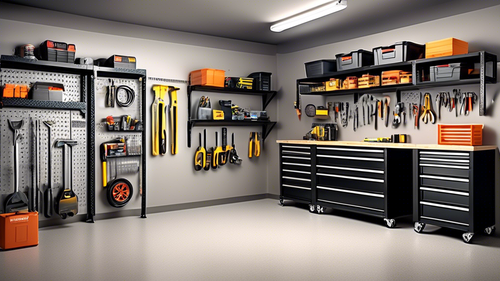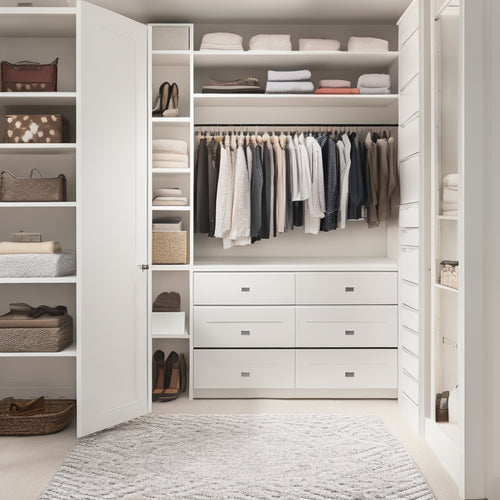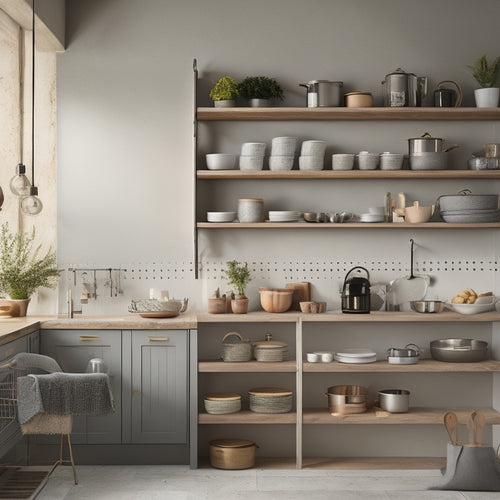
Expert Organizer Shares Strategies for Children With ADHD
Share
As a professional organizer specializing in ADHD, I've developed a suite of strategies that empower children with ADHD to take control of their space, time, and tasks, ultimately unleashing their full potential. Labels, simplified containers, and color-coding aid organization, creating clear and consistent identification that adds engagement and fun. Parental involvement and emotional support are essential for developing organizational skills, fostering security and confidence. By implementing these tactics, parents can create a supportive environment that enables their child to focus on learning and enjoyment. Now, let's explore the specifics of how to bring these strategies to life in your child's daily routine.
Key Takeaways
• Labels, simplified containers, and color-coding create an engaging and organized environment for children with ADHD to focus and learn.
• Parental involvement and emotional support are crucial for developing organizational skills and fostering security and confidence in children with ADHD.
• Establishing clear boundaries and staying calm and patient reduces conflict and anxiety, making it easier to discipline with empathy and understanding.
• Accessing reliable educational resources, such as webinars and online communities, provides expert advice and support for managing ADHD symptoms and understanding children's needs.
• Simplifying storage solutions with one bin per category and using a label maker creates clear and consistent identification, making it easier for children with ADHD to maintain organization.
Effective Organizing Strategies
To help my child with ADHD stay organized, I've found that using a combination of labels, simplified containers, and color-coding creates a system that's both functional and visually appealing.
This practical solution tackles one of the biggest organizing challenges children with ADHD face: keeping track of their belongings. By using a label maker, I create clear and consistent labels that help my child quickly identify what's inside each container.
Simplifying storage solutions, such as using one bin per category, also makes it easier for them to find what they need. Additionally, color-coding adds a creative technique that makes the system more engaging and fun to use.
With these strategies in place, my child can focus on more important things – like learning and having fun!
Supporting Parents and Children
As I navigate the challenges of raising a child with ADHD, I've come to realize that supporting both my child and myself is vital to their success and my own sanity.
Parental involvement is essential in helping my child develop organizational skills and emotional regulation. I make sure to offer emotional support by being patient, understanding, and empathetic. This helps my child feel more secure and confident, which in turn, enables them to better focus on their tasks.
Navigating Parental Interactions
When I share my experiences and challenges with other parents of children with ADHD, I'm often met with well-intentioned but misguided comments that can be more hurtful than helpful. It's crucial to establish boundaries and politely decline unsolicited advice, focusing instead on fostering understanding and empathy.
By doing so, I create a safe space to openly discuss my child's needs without feeling judged or criticized. I encourage other parents to do the same, prioritizing supportive relationships that promote collaboration and mutual respect.
Disciplining With Empathy
I've learned that disciplining my child with ADHD requires a delicate balance of empathy and authority, which starts with understanding that their misbehavior is often a cry for help rather than a deliberate attempt to disobey. This shift in perspective has transformed our interactions, allowing me to respond with compassion and patience instead of frustration.
| Disciplining with Empathy | Benefits |
|---|---|
| Understand boundaries | Builds trust and respect |
| Use positive reinforcement | Encourages good behavior |
| Stay calm and patient | Reduces conflict and anxiety |
Accessing Educational Resources
By tapping into a wealth of educational resources, I'm better equipped to support my child's learning and development, from webinars and newsletters to guides and expert advice. I've found that finding reliable resources and engaging in online communities has been instrumental in helping me understand my child's needs.
Here are some of my go-to resources:
-
ADDitude's Webinars: Insights on managing ADHD symptoms and school-related challenges.
-
The ADHD Newsletter: Updates on research, tips for symptom management, and resources for parents.
-
The ADHD Parenting Guide: Covers behavior management, communication tips, routines, medication options, and self-care importance.
- Online Communities: Connecting with other parents who share similar experiences and challenges.
Frequently Asked Questions
How Do I Help My Child With ADHD Develop a Sense of Responsibility?
I help my child with ADHD develop a sense of responsibility by gradually building independence through simple tasks, fostering accountability by setting clear expectations, and consistently following up to make sure they're meeting their commitments.
Can My Child's ADHD Be Caused by Poor Parenting or Diet?
I want to reassure you that ADHD isn't caused by poor parenting or diet alone. Research shows it's a complex interplay of genetic factors and environment. Let's focus on embracing neurodiversity and reducing stigma, rather than blame.
How Do I Balance Giving My Child Freedom and Setting Boundaries?
I struggle to balance giving my child freedom and setting boundaries, but I've learned that finding balance is key - by empowering choices and setting clear expectations, I can foster independence while maintaining necessary boundaries.
Are There Any Adhd-Friendly Extracurricular Activities to Consider?
As a parent, I consider ADHD-friendly extracurricular activities that cater to my child's unique needs, such as outdoor sports like soccer or swimming, and creative arts like painting or pottery, which promote focus and self-expression.
Can My Child With ADHD Excel in a Traditional Classroom Setting?
As a parent, I've learned that 75% of kids with ADHD have difficulty with organization and time management, making traditional classrooms challenging. However, with classroom accommodations and alternative learning environments, my child can thrive and excel.
Related Posts
-

Optimal Garage Storage Depth
Tired of your garage resembling a disorganized mess, with items precariously piled up everywhere, just waiting to...
-

Designing Custom Shelving for Closet Organization Success
When designing custom shelving for closet organization success, you'll need to assess your closet's unique dimensions...
-

Build Compact Kitchen Shelves in 5 Steps
You can create a compact kitchen shelf that maximizes storage and efficiency in just five easy-to-follow steps. First...


